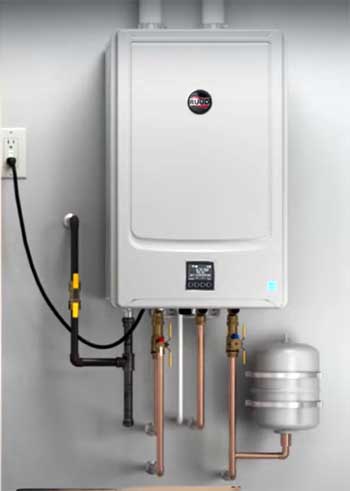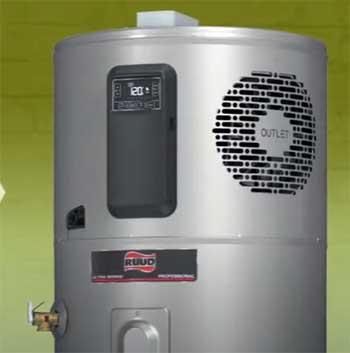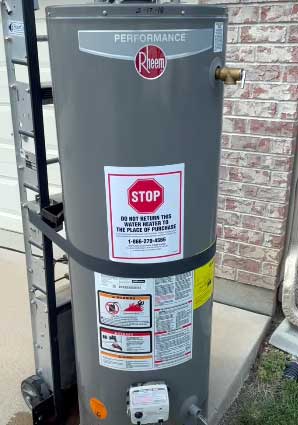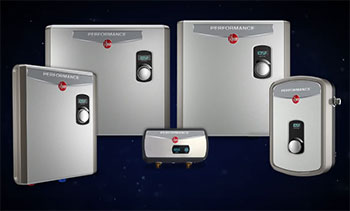I’ve been through the wringer trying to pick the perfect water heater for my home, and I know I’m not alone. When it comes to RUUD and Rheem, two brands that seem to pop up everywhere, the choice isn’t as straightforward as it looks.
In this article, I’ll walk you through my experience comparing RUUD and Rheem water heaters, breaking down their pros, cons, and key features in a conversational, real-world way. My goal? To help you figure out which brand fits your home’s needs, budget, and lifestyle with a clear, analytical perspective.
A Brief Comparison Table
| Feature | RUUD | Rheem |
| Price Range | More affordable, often $100-$200 cheaper than Rheem for similar models | Premium pricing, reflects higher-end materials and features |
| Warranty | Typically 6-10 years, some models up to 12 years | Often 6-12 years, with premium models offering extended coverage |
| Energy Efficiency | Good (0.51-0.83 UEF), some ENERGY STAR models | Excellent (up to 4.07 UEF in hybrids), strong focus on efficiency |
| Durability | Copper pipes, solid but less resistant to corrosion | Aluminum pipes, superior corrosion resistance |
| Model Variety | Gas, electric, tankless, hybrid; focus on residential | Gas, electric, tankless, hybrid, solar; residential and commercial |
| Smart Features | EcoNet app for select models, basic remote control | Advanced EcoNet integration, leak detection, demand response |
| Installation | Straightforward, widely available through contractors | Easy but often requires professional setup for optimal performance |
| Maintenance | EverKleen system reduces sediment; moderate maintenance needs | Low-maintenance designs, especially in Marathon series |
| Availability | Contractors, HVAC suppliers, some online retailers | Widely available online, contractors, and big-box stores |
| Reputation | Reliable, budget-friendly, slightly fewer premium features | Premium brand, innovative tech, mixed reliability reviews |
My Journey Into The World of Water Heaters

When my old water heater started acting up—think lukewarm showers and a suspicious puddle in the basement—I knew it was time for a replacement.
I started researching, and RUUD and Rheem kept showing up as top contenders.
At first, I thought they were completely different brands, but I quickly learned they’re more like siblings under the same parent company, The Paloma Group.
This discovery made my decision both easier and harder.
Easier because they share similar tech and manufacturing standards, but harder because the differences are subtle and require some digging to understand.
I wanted a water heater that would last, save me money on energy bills, and fit my family’s needs without breaking the bank. I’m a practical guy, so I approached this like a puzzle, comparing features, costs, and long-term value.
Here’s what I found after weeks of research, talking to plumbers, and reading user reviews.
Understanding RUUD and Rheem: The Basics
Let’s start with the backstory. Rheem, founded in 1925, is a California-based heavyweight in the HVAC and water heating world. They’re known for their wide range of products, from traditional tank models to cutting-edge tankless and hybrid systems.
RUUD, established in 1897 by Edwin Ruud, was a pioneer in automatic water heaters. In 1959, Rheem acquired RUUD, and today, they operate as sister brands under The Paloma Group. Think of RUUD as the budget-conscious cousin and Rheem as the premium, tech-savvy one.
Both brands are manufactured in similar facilities, often in the U.S. or Mexico, and share core technologies like the EcoNet app for smart control and Rheemglas lining for corrosion resistance. But their marketing and product positioning differ.
RUUD targets affordability and reliability for residential use, while Rheem leans into innovation, offering premium features and commercial-grade options.
Key Features of RUUD Water Heaters
RUUD water heaters caught my eye because they’re often praised for being dependable without costing a fortune. Here’s what stands out:

- Affordable Pricing: RUUD models, like the Professional Achiever series, often cost $700-$800 for a 50-gallon tank, making them a go-to for budget shoppers.
- EverKleen System: This feature reduces sediment buildup, which means less maintenance and a longer tank life. My old heater had sediment issues, so this was a big plus.
- Guardian System: A safety feature that shuts off the heater if it detects flammable vapors, giving me peace of mind in my garage setup.
- EcoNet Compatibility: Some models let you control temperature and monitor energy use via the EcoNet app. It’s not as advanced as Rheem’s version, but it gets the job done.
- Variety of Models: RUUD offers gas, electric, tankless, and hybrid models, with tank sizes from 2.5 to 50 gallons. Their tabletop 40-gallon model is a neat option for small spaces like apartments.
- Warranty: Most RUUD heaters come with 6-10 years of coverage, with some models, like the Pacemaker, offering up to 12 years with a premium anode rod.
I liked that RUUD keeps things simple. Their heaters are built for the average homeowner who wants hot water without fuss. The copper pipes in RUUD models keep costs down, but I noticed they might not be as corrosion-resistant as Rheem’s aluminum pipes.
Pros And Cons of RUUD Water Heaters
Pros
- Cost-Effective: RUUD’s lower price point makes it easier to fit into a tight budget. A 50-gallon Professional Achiever model costs around $552-$800, compared to Rheem’s $799-$1,200 for similar specs.
- Reliable Performance: RUUD heaters are built to last, often running for 10-12 years with proper maintenance. The Guardian System and Rheemglas lining add to their durability.
- Low Maintenance: The EverKleen system reduces sediment, meaning less frequent flushing. I’ve dealt with sediment-clogged heaters before, so this was a relief.
- Wide Availability: You can find RUUD through contractors, HVAC suppliers, and some online retailers, making it easy to source.
- Energy Savings: Models like the Ultra Series hit 0.83 UEF, and some are ENERGY STAR certified, which could lower my utility bills.
Cons
- Copper Pipes: While cheaper, copper is less corrosion-resistant than aluminum, potentially leading to earlier wear in hard water areas.
- Basic Smart Features: The EcoNet app is functional but lacks the advanced leak detection and demand response of Rheem’s version.
- Fewer Premium Options: RUUD focuses on residential use, so if you need commercial-grade or solar models, you’re out of luck.
- Occasional Leaks: Some users report microscopic fractures in RUUD tanks, leading to leaks after 8-10 years. This worried me, given my past experience with leaks.
Key Features of Rheem Water Heaters
Rheem, on the other hand, feels like the flashier sibling. They’ve got a reputation for pushing the envelope with tech and efficiency. Here’s what I found:

- Premium Materials: Rheem uses aluminum pipes, which resist corrosion better than RUUD’s copper. Their Marathon series has non-metallic tanks, making them virtually rust-proof.
- Energy Efficiency: Rheem’s hybrid models, like the ProTerra, boast Uniform Energy Factor (UEF) ratings up to 4.07, which is top-tier. This could save me hundreds on energy bills annually.
- Smart Technology: Rheem’s EcoNet app is more robust, offering features like leak detection and demand response for utility savings. I was impressed by the automatic shutoff in case of leaks—perfect for avoiding basement floods.
- Diverse Lineup: From tankless to solar-powered models, Rheem covers residential and commercial needs. Their Performance Platinum 50-gallon model can deliver 77 gallons in the first hour, ideal for my five-person household.
- Warranty: Rheem matches RUUD with 6-12 year warranties but often includes extended coverage on premium models. Their customer service also gets high marks for quick replacements.
- Ease of Installation: Rheem heaters, especially the Marathon series, are lightweight (around 103 pounds for a 50-gallon tank) and come with accessories like NPT adapters for easier setup.
Rheem’s focus on innovation made me feel like I was investing in the future, but the higher price tag—often $1,000 or more for a 50-gallon tank—gave me pause.
Pros And Cons of Rheem Water Heaters
Pros
- Superior Durability: Aluminum pipes and non-metallic tanks (in models like the Marathon) make Rheem heaters resistant to rust and corrosion, potentially lasting 15 years or more.
- High Efficiency: With UEF ratings as high as 4.07 in hybrid models, Rheem could save me nearly $500 a year compared to standard electric heaters.
- Advanced Technology: Features like leak detection, Wi-Fi connectivity, and demand response make Rheem feel like a smart home upgrade.
- Versatile Models: Rheem’s lineup includes everything from point-of-use to commercial-grade heaters, giving me options for any scenario.
- Strong Warranty Support: Rheem’s 10-12 year warranties and responsive customer service (based on user reviews) gave me confidence in their after-sales support.
Cons
- Higher Cost: Rheem’s premium features come with a premium price, often $200-$400 more than RUUD for comparable models.
- Mixed Reliability: Some users report issues with newer models, like faulty thermistors or gas valves, though Rheem’s support often resolves these quickly.
- Complex Installation: While straightforward, some Rheem models (especially hybrids) require professional installation to meet warranty terms, adding to costs.
- Noise Concerns: Hybrid models like the ProTerra can be noisy (around 58 dB), which might be an issue in a quiet home.
Where RUUD And Rheem Water Heaters Differ?
Now, let’s break down the key differences that shaped my decision. First, there’s the price. RUUD’s affordability is hard to beat. For a 50-gallon gas heater, I could spend around $700 on a RUUD Professional Achiever, while a Rheem Performance Platinum might set me back $1,000.
If budget is your main concern, RUUD is the clear winner.
But then there’s durability. Rheem’s aluminum pipes and non-metallic tanks (in models like the Marathon) are designed to outlast RUUD’s copper pipes. In my area, where hard water is a problem, corrosion resistance is a big deal.
Rheem’s materials gave me more confidence for long-term reliability, especially since I’ve dealt with rusty tanks before.
Energy efficiency is another battleground. Rheem’s hybrid models, like the ProTerra, achieve UEF ratings of 3.88-4.07, compared to RUUD’s 0.51-0.83 for most models. For a family like mine, with high hot water demand, Rheem’s efficiency could translate to $300-$500 in annual savings.
RUUD’s Ultra Series is efficient, but it doesn’t match Rheem’s top-end hybrids.
Smart features also tip the scales. Rheem’s EcoNet app offers advanced controls, like leak detection and integration with utility programs for rebates (one user mentioned earning $5/month). RUUD’s EcoNet is simpler, focusing on basic temperature control.
If you’re into smart home tech, Rheem feels more future-proof.
Installation and maintenance are fairly similar, but Rheem’s lightweight designs and included accessories (like NPT adapters) make DIY setups a bit easier. RUUD’s EverKleen system reduces maintenance, but Rheem’s non-metallic tanks require even less upkeep.
Both brands are widely available, though Rheem’s presence in big-box stores like Home Depot gives it a slight edge for convenience.
Ownership Experience: What Users Say
I dug into user reviews to get a real-world sense of ownership. RUUD owners often praise the brand’s reliability and value. One user on a plumbing forum said their RUUD Pacemaker lasted 12 years with minimal maintenance, thanks to the EverKleen system.
But others mentioned leaks after 8-10 years, especially in areas with hard water. This matched my concern about copper pipes.
Rheem’s reviews are a mixed bag. Many love the energy savings and smart features. A GreenBuildingAdvisor user raved about the ProTerra’s efficiency and Rheem’s responsive support when a thermistor failed. But some reported issues with newer models, like defective gas valves or noisy compressors.
A ConsumerAffairs review mentioned a Rheem tank failing just before the 9-year warranty expired, though Rheem replaced it promptly.
Plumbers I spoke to had opinions too. One swore by RUUD for its affordability and ease of repair, while another preferred Rheem for its durability and commercial-grade options. Interestingly, some plumbers warned against buying Rheem from big-box stores, claiming those models use cheaper components than those from professional suppliers.
Life Expectancy And Reliability

On average, RUUD water heaters last 10-12 years, with proper maintenance extending that to 15 years in some cases.
Their magnesium anode rods and Rheemglas lining help, but copper pipes can wear out faster in harsh water conditions.
Rheem heaters, especially the Marathon and ProTerra models, can hit 15 years or more, thanks to corrosion-resistant materials. However, some users report issues with newer Rheem models, like leak detection devices or thermistors, which can dent reliability.
In terms of reliability, both brands are solid but not flawless. RUUD’s simpler designs mean fewer parts to fail, but Rheem’s advanced tech can be a double-edged sword—great when it works, but frustrating if a component like a thermistor acts up. If you maintain your heater (flushing annually, checking the anode rod), either brand should serve you well.
My Decision-Making Process
Choosing between RUUD and Rheem came down to my priorities. I needed a 50-gallon gas heater for my family of five, with a focus on energy savings and durability. My budget was around $1,000, but I was willing to stretch for long-term value. Here’s how I weighed the options:
- Budget: RUUD’s lower price was tempting. I could get a Professional Achiever for $700 and stay under budget. Rheem’s Performance Platinum, at $1,000, pushed my limit but promised better efficiency.
- Efficiency: Rheem’s higher UEF ratings and hybrid options could save me $300-$500 a year, which adds up over a decade. RUUD’s efficiency was decent but not game-changing.
- Durability: Rheem’s aluminum pipes and non-metallic tanks felt like a safer bet for my hard water area. RUUD’s copper pipes made me nervous about corrosion.
- Features: I liked Rheem’s advanced EcoNet features, especially leak detection. RUUD’s simpler app was fine but less exciting.
- Warranty: Both offered 6-12 years, but Rheem’s reputation for responsive support edged out slightly.
After much back-and-forth, I leaned toward Rheem. The higher upfront cost stung, but the potential energy savings, durability, and smart features felt worth it. That said, if my budget was tighter, I’d have gone with RUUD without hesitation—it’s a solid choice for the price.
Also Read: Is King Water Filtration Worth It?
Frequently Asked Question (FAQ)
Not exactly. RUUD and Rheem are sister brands under The Paloma Group, sharing similar tech and manufacturing. RUUD focuses on affordability, while Rheem offers premium features and materials.
Reliability varies, but A.O. Smith and Bradford White often top plumber recommendations for durability. Rheem and RUUD are reliable too, with Rheem’s premium models slightly edging out RUUD.
RUUD water heaters typically last 10-12 years with proper maintenance. Some models can reach 15 years, depending on water quality and upkeep.
No, RUUD doesn’t own Rheem. Rheem acquired RUUD in 1959, and both are now part of The Paloma Group, operating as separate brands.
Conclusion: Which Should You Choose?
You’re probably standing at the same crossroads I was, trying to pick between RUUD and Rheem. If you’re watching your wallet and want a reliable, no-frills water heater, RUUD is your best bet. Its affordability, solid performance, and low maintenance make it perfect for most homes.
But if you’re willing to spend more for energy savings, advanced tech, and longer-lasting materials, Rheem’s premium features are hard to beat. Whichever you choose, both brands offer quality you can trust—just make sure to maintain your heater and check those warranty terms.
What’s your priority: saving upfront or investing in the long haul? Let that guide your decision.
